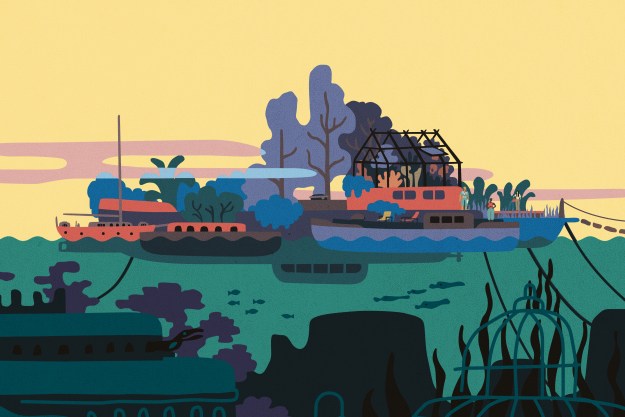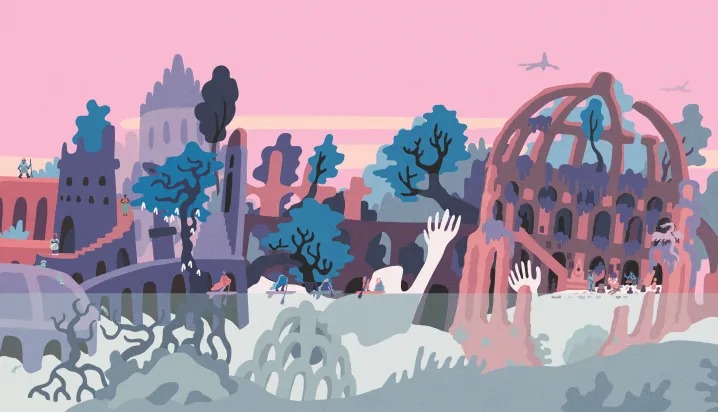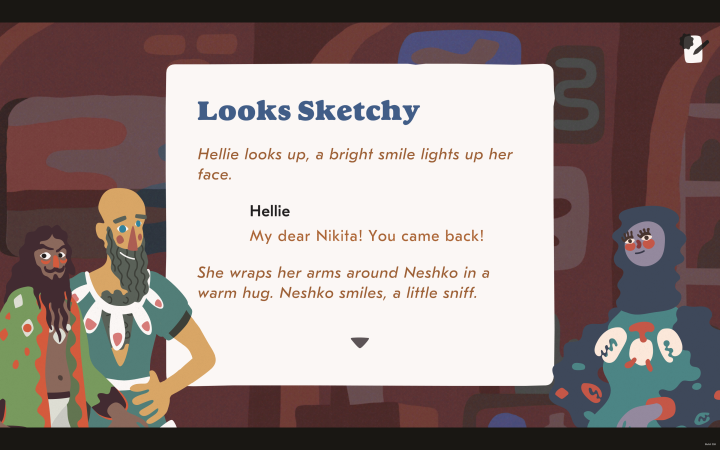
“Saltsea Chronicles is a poignant nautical adventure about the distances between us and what we gain from crossing them.”
- Vibrant art style
- Rich world
- Endearing characters
- Thoughtful dialogue systems
- Dialogue can feel tedious
- Lacking meaningful interactions
The stakes are high. My misfit crew of sailors is midway through an island-trotting quest to find their missing captain. Rations are running low and there may be more disappearances to worry about. Yet, here I am partying on an island full of crabs. I see it as a fun reprieve from the stress of a water-logged post-apocalypse at first, but a crew member later posits that there’s something more significant to celebrations than simple fun: They’re an acknowledgment that everything is impermanent and that we have to honor what we have while it’s still here.
That bittersweet theme guides me through Saltsea Chronicles, a new narrative adventure by the creators of 2019’s Seamas McNally award-winning Mutazione. I may be exploring distant islands built on a flooded world, but my journey is anything but tragic. I’m soaking in cultures, earnestly working to understand and appreciate them. A dark fate may await my crew once we finally reach the end of our mystery, but that doesn’t mean we can’t stop to celebrate the miracles that surround us.
So long as you can handle a lengthy visual novel that requires a lot of button pressing to skip through text, Saltsea Chronicles is another moving narrative game from developer Die Gute Fabrik. An engrossing central mystery serves as a sturdy skeleton housing the adventure’s real heart: an endearing cast of characters eager to admire a densely detailed world with one another.
Sightseeing in a new world
Saltsea Chronicles is technically a post-apocalyptic game, but that description makes it sound much grimmer than it is. A bit of historical table setting tells players that a once thriving world was destroyed due to climate change exacerbated by mega-corporations. When the tides rose, society was forced to rebuild on a series of islands. Rather than dealing with the immediate fallout of that, the story takes place far in the future where the world seems to be in harmony.

The adventure takes players to a series of colorful islands, each of which is painted in Die Gute Fabrik’s signature visual style. The 2D environments are both minimalistic and richly detailed, mixing solid splotches of color with gentle shapes that come together to create luscious flora wrapped around imperfect human structures. It’s a series of landscape paintings that strips each island down to its basics without losing its identity. It’s the same visual style that’s made Mutazione a constant fixture in my brain since I played it.
Even if you didn’t know both games were by the same developer on sight alone, it becomes clear when it begins worldbuilding. The adventure begins with a simple mystery; a boat’s captain, Maja, has disappeared and the crew vows to track them down. Players don’t control one character, but rather the full cast. While the goal is to find some leads, the bulk of the experience is spent learning about each island and its specific culture. One chapter takes me to an observatory perched on a cliff, where I meet an island full of curious researchers. Another takes me to a society of spiritual guides called dreamsailors who can both help me find a way forward and help heal any grief I’m carrying. I’m not learning about the ruins of the old world, but rather the vibrant one that’s sprung from it.
A hopeful story about those distances between us … and what we gain by braving the gaps.
That learning process entirely happens through dialogue, as Saltsea Chronicles is even more of a straight visual novel than Mutazione. Rather than freely walking around islands, players simply click on highlighted points of interest to open dialogue exchanges that unfold in a screenplay-like structure, complete with stage directions between lines. That minimal gameplay flow can be tiring considering there are no voiced lines or auto-advance text options.
The lack of interaction is a bit of a step down from Mutazione, which expertly pushes players to learn about its lush world through freer exploration and a gardening component. I’m more of a tourist in Saltsea Chronicles, only ever getting to interact with my surroundings through local card games. That’s reinforced by a compendium full of collectibles that logs everything I’ve seen as a sticker on a page but doesn’t give me much context on them. I’m a sightseer who yearns to be an explorer.
Closing the distance
While there’s some distance in its gameplay, there’s still enough to draw me in over 10 hours of story. Its central mystery is a strong hook that dips in and out of magical realism. I’m also tasked with making some important choices that can have a major impact on how my story unfolds. Different decisions will create ongoing “issues” with my crew that I need to work to resolve through my dialogue choices. If I invite a new crew member onto my ship, for instance, that could create some tension with my shipmates. There are always consequences to my choices, even if they don’t reveal themselves until much later.
What draws me in more than anything is Saltsea Chronicles’ eclectic cast of characters. I became invested in everyone’s story by the end, from the reluctant leader Stew to the radio-obsessed Iris. These characters and their struggles aren’t alone with their problems, though, and developer Die Gute Fabrik emphasizes that with some subtle gameplay systems. For one, I’m never controlling one character, but the full ensemble. When presented with dialogue choices, I’m not so much given lines a character will say verbatim as I am emotional prompts for different characters. I’m more shaping the interpersonal relationships between the crew as their journey unfolds.

That idea is at its most impactful during island exploration. In each chapter, I have to choose two characters to take ashore. That decision allows me to focus on resolving specific issues between crew members or simply learn more about each person by how they bounce off one another. The most meaningful moment in my adventure came when I sent Stew and Iris out on a mission together, finding common ground between two totally different people bonded by loss.
Our world doesn’t exist in a vacuum; both people and cultures are shaped by one another. Sometimes we may feel like distant islands lost at sea, but we’re all together in the same ocean. Saltsea Chronicles celebrates that idea with a hopeful story about those distances between us, whether they be physical or emotional, and what we gain by braving the gaps. Even if we know the ocean will wash us all away with time, that doesn’t mean we should ever stop sailing.
Saltsea Chronicles was tested on PC and Steam Deck.
Editors' Recommendations
- Dave the Diver: tips and tricks for conquering the undersea adventure
- Among Us adds in-game purchases, experience points, and more in huge update




